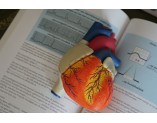Parkinson's disease
Parkinson's disease is a progressive brain disorder that affects movement and mental capacity. There is no known cure for this disease as of yet, only treatment options to manage the symptoms.
Parkinson’s occurs when cells in the brain’s substantia nigra begin to expire. The cells in the substantia nigra manufacture a chemical called dopamine which sends signals to the brain that control movement and coordination.
Early symptoms of Parkinson’s disease usually appear after the age of 60 years. Early-onset of the disease can strike people around the age of 40 years, or in some cases, even earlier.
- Dementia symptoms tend to emerge later (after about 10 to 15 years) in the course of the disease.
- Dementia is quite rare in people with onset of Parkinson's disease before age 50, even though the disease is of a long duration.
- Dementia is more frequent in people that are older, usually around 70, at the onset of the disease.
Statistics about Parkinson’s disease
- One million people in the U.S
- Roughly 60,000 people are diagnosed with Parkinson’s each year
- Men are one and a half times more likely to have the disease than women
- Onset of Parkinson's disease in the elderly is typically age 60
Signs and symptoms of Parkinson’s
- Tremors or shaking usually begins in the fingers or hands.
- Slowed mobility (bradykinesia). As the disease progresses, a decrease in the ability to move and slowed movement occur, making basic tasks difficult and arduous.
- Stiff or rigid muscles. Muscle stiffness can occur in any part of the body. Muscle rigidity can restrict your range of motion and cause pain.
- Diminished posture and balance. Posture may become hunched, or have balance problems as a result of Parkinson's disease.
- Loss of involuntary movement. In Parkinson's disease, there may be a decreased ability to perform automatic movements, including smiling, blinking or swinging your arms when you walk. You may also stop gesturing when talking.
- Changes in speech. Speech problems can occur as a result of Parkinson's disease. Changes in speech can include speaking softly, quickly, slur or hesitate before talking.
- Changes in writing. Writing may appear small and become challenging.
Treatment options for Parkinson’s patients
Because there is no known cure for Parkinson’s disease, the treatment options are used merely to relieve some of the symptoms.
One of the most intense symptoms of Parkinson’s is tremors and physicians will prescribe dopamine agonists to counteract this. These drugs mimic the effects of dopamine in the brain.
Exercise is an additional way to deal with the symptoms of this disease. Activities like yoga, bicycling and tai chi can increase your motor skills, balance and flexibility. Medical professionals recommend regular exercise with increased efforts worked in a few times a week.
Help for patients with Parkinson’s
Patients with this complex and debilitating condition need individualized care tailored to their needs to give optimal symptom control.
As the disease advances, daily tasks become increasingly difficult. Some people with Parkinson's ultimately develop dementia or confusion and small sounds may frighten them. The need for increased care becomes necessary as they are unable to accomplish simple daily tasks such as bathing, dressing, walking, eating or drinking.
Because cognitive changes and behaviors are frequently experienced in the advanced stages of Parkinson's disease, it is important to seek help either from an in-home caregiver, adult daycare, assisted living facility, residential care home or a nursing home that is knowledgeable and prepared to care for Parkinson’s patients.
Because Parkinson’s is a progressive disease the best option would be to place the person in a facility that will provide care for the entire interim of disease. Residential care homes, nursing homes or hiring a private in home caregiver will be a good decision because once the patient becomes bedridden, assisted living can no longer provide the necessary services. Home health care agencies that provide nursing, physical therapy and hospice care can provide services at the patient’s residential care home to allow for continuum of care during the progression of disease. Nursing homes provide these progressive services onsite and in-house.
Seeking help from caregivers can make life much easier for many suffering from Parkinson's disease. An educated caregiver knows enough about Parkinson's not to expect too much from a patient, and to know where the boundaries lie between what they can or can't do during various stages of the disease process. By planning ahead, a caregiver may be able to anticipate problems or issues before they negatively affect the person.
There are many options that can offer an important and practical living or housing alternative for individuals affected by Parkinson's and can also provide substantial relief to those who have assumed the role as caregiver.









